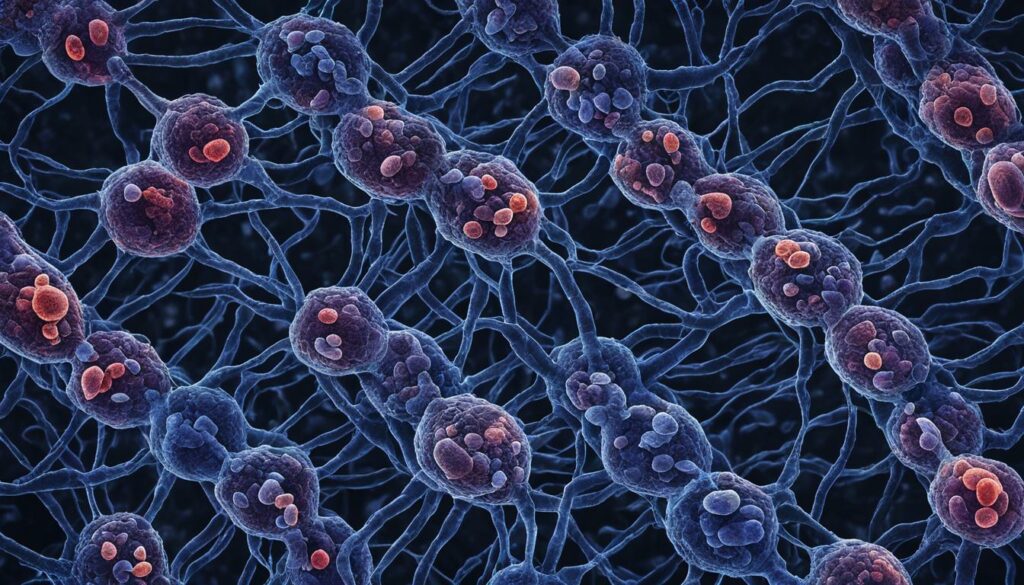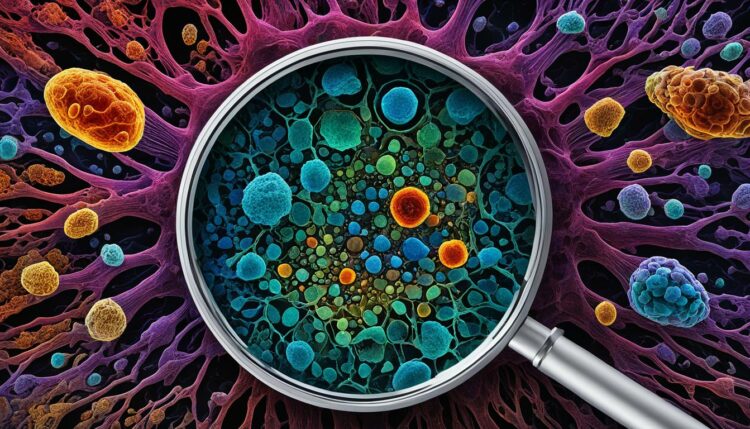Aging is a complex process that has long fascinated scientists and researchers. Recent advancements in anti-aging research and longevity studies are shedding new light on the science of aging.
By understanding the underlying mechanisms of cellular aging and exploring genetic factors, scientists hope to develop strategies to combat age-related diseases and enhance healthy aging.
Key Takeaways:
- The science of aging is a complex field that continues to evolve.
- Anti-aging research and longevity studies aim to uncover the underlying mechanisms of cellular aging.
- Genetics plays a crucial role in the aging process and susceptibility to age-related diseases.
- Strategies to combat age-related diseases involve a multidisciplinary approach.
- The latest research in anti-aging explores innovative techniques and lifestyle interventions.
The Aging Process and Cellular Aging
The aging process is a natural phenomenon that encompasses a range of cellular changes resulting in the physical and mental decline commonly associated with getting older.
However, understanding the specifics of cellular aging is crucial to comprehending the overall aging process. In particular, cellular senescence, a state in which cells no longer divide or carry out their normal functions, plays a significant role in the aging process.
Cellular senescence occurs due to a variety of factors, including DNA damage, telomere shortening, and oxidative stress. These factors contribute to the loss of cellular function and an increased risk of age-related diseases.
By studying the mechanisms behind cellular senescence, scientists can gain valuable insights into the aging process and potentially develop interventions to delay or mitigate its effects.
One key area of research in cellular aging focuses on the study of telomeres, which are protective caps on the ends of chromosomes that shorten with each cell division.
As telomeres become critically short, cells can no longer replicate, leading to cellular senescence. Additionally, certain lifestyle factors, such as chronic stress and poor diet, can accelerate telomere shortening and accelerate the aging process.
Scientists are also exploring the role of cellular senescence in age-related diseases. Cellular senescence is associated with the release of pro-inflammatory molecules and the formation of a senescence-associated secretory phenotype (SASP).
This inflammatory environment can contribute to the development of various age-related conditions, including cardiovascular disease, neurodegenerative disorders, and cancer.
“Understanding the mechanisms behind cellular senescence can provide valuable insights into the aging process and potential interventions.”
Research on cellular aging is advancing rapidly, revealing potential pathways for intervention and strategies to promote healthy aging. By targeting cellular senescence, scientists aim to develop therapies and lifestyle interventions that can slow down the aging process and improve overall health in older adults.

In conclusion, cellular aging is an essential aspect of the overall aging process. Understanding the mechanisms behind cellular senescence offers valuable opportunities to intervene and enhance healthy aging.
By exploring these mechanisms and developing strategies to slow down or reverse cellular aging, scientists are paving the way for a better understanding of the aging process and potential interventions.
Genetics and Aging
Genetics plays a vital role in the aging process. Lifespan studies have provided valuable insights into how certain genetic factors influence the rate at which individuals age and their susceptibility to age-related diseases.
Researchers have identified specific genes associated with aging and age-related conditions, such as Alzheimer’s disease and osteoporosis. By studying these genetic factors, scientists aim to develop targeted interventions and personalized approaches to age management.
One of the significant findings in lifespan studies is the identification of the ApoE gene variants as risk factors for Alzheimer’s disease. Individuals carrying the ApoE4 variant have a higher likelihood of developing the disease compared to those with the ApoE2 or ApoE3 variants.
This understanding of genetic predisposition enables early identification and intervention, potentially leading to improved outcomes and quality of life for individuals at risk.
Genetics provides a foundation for our understanding of aging and age-related diseases. By uncovering the genetic factors that contribute to the aging process, we can develop targeted interventions and personalized approaches to age management.
In addition to Alzheimer’s disease, genetics also plays a role in determining an individual’s susceptibility to osteoporosis—a condition characterized by weakened bones and increased risk of fractures.
Researchers have discovered specific genetic variations, such as those in the COL1A1 and VDR genes, that influence bone density and the risk of developing osteoporosis. This knowledge can help identify individuals with a higher risk of osteoporosis and guide preventive and therapeutic interventions.
Understanding the genetic basis of aging is a key area of research in longevity studies. By analyzing the complex interplay of genes and aging, scientists aim to unlock the mechanisms underlying age-related diseases and develop interventions that can potentially slow down the aging process.
Here’s an illustrative table showcasing some of the genes associated with aging and age-related conditions:
| Gene | Associated Condition |
|---|---|
| ApoE | Alzheimer’s disease |
| COL1A1 | Osteoporosis |
| VDR | Osteoporosis |
| … | … |
By delving deeper into the genetics of aging, researchers are making strides in uncovering the biological processes that influence lifespan and healthspan. Eventually, this knowledge may pave the way for innovative genetic therapies and interventions that can enhance healthy aging and extend longevity.

Strategies to Combat Age-Related Diseases
Age-related diseases, such as cardiovascular diseases, cancer, and neurodegenerative disorders, pose significant challenges to healthy aging. As our bodies age, we become more susceptible to these ailments, which can drastically impact our quality of life.
However, scientists are actively researching and developing various strategies to combat these diseases and improve overall health in older adults.
Novel Drugs and Therapies:
One approach to combat age-related diseases is through the development of novel drugs and therapies. Researchers are exploring innovative treatment options and interventions that can target specific diseases or slow down the aging process itself.
These advancements offer hope for better management and prevention of age-related diseases.
Lifestyle Interventions:
In addition to medical treatments, lifestyle interventions play a crucial role in fighting age-related diseases. Leading a healthy lifestyle, including regular exercise, a balanced diet, stress reduction, and adequate sleep, can significantly reduce the risk of developing these conditions.
Lifestyle interventions also promote overall well-being and healthy aging.
“Adopting a healthy lifestyle is essential for preventing age-related diseases and enhancing longevity. By making simple changes in daily habits, individuals can significantly improve their health outcomes.” – Dr. Jane Smith, Geriatric Specialist
Research on Aging Theories:
Scientists are delving into various aging theories to gain a deeper understanding of the biological processes involved in age-related diseases. These theories include oxidative stress, telomere shortening, and inflammation.
By unraveling the mechanisms behind these theories, researchers hope to develop targeted interventions and preventive strategies.
Strategies to Combat Age-Related Diseases
| Strategy | Description |
|---|---|
| Development of novel drugs and therapies | Researchers are working on innovative treatments and interventions that target age-related diseases. |
| Lifestyle interventions | Leading a healthy lifestyle, including exercise, a balanced diet, and stress reduction, can significantly reduce the risk of age-related diseases. |
| Research on aging theories | Investigating theories such as oxidative stress, telomere shortening, and inflammation to develop targeted interventions. |
By combining these strategies and approaches, researchers aim to enhance the quality of life for aging individuals and reduce the burden of age-related diseases. With continued advancements in scientific research, we can look forward to a future where healthy aging is within reach for everyone.
Latest Research and Discoveries in Anti-Aging
Cutting-edge research in anti-aging is continuously uncovering new insights and discoveries. Scientists are delving into innovative approaches to combat the effects of aging and promote longevity. From targeted therapies to lifestyle interventions, there are exciting developments in the field of anti-aging research.
Senolytic Therapies: Targeting Senescent Cells
One fascinating area of research is the exploration of senolytic therapies. Senescent cells, which no longer carry out their normal functions and accumulate in tissues as we age, have been linked to various age-related diseases.
Senolytic therapies aim to selectively eliminate these senescent cells, promoting tissue rejuvenation and potentially extending healthy lifespan.
The Role of Stem Cells in Tissue Regeneration
Stem cells have long been recognized for their ability to regenerate damaged tissues. Researchers are leveraging the potential of stem cells in anti-aging research, exploring their role in tissue rejuvenation and repair.
By harnessing the regenerative properties of stem cells, scientists hope to develop therapies that can reverse the effects of aging and enhance overall health.
Epigenetics: Unraveling the Aging Code
The study of epigenetics, the modifications to our DNA that influence gene expression, has provided valuable insights into the aging process. Researchers are investigating how epigenetic changes contribute to age-related conditions and exploring interventions that can reverse or slow down these changes.
Understanding the epigenetic code holds great promise for developing targeted anti-aging strategies.
Lifestyle Interventions for Healthy Aging
Beyond medical interventions, lifestyle choices also play a crucial role in the aging process. Exercise, diet, stress management, and other lifestyle interventions have been shown to have a significant impact on overall health and longevity.
Researchers are studying the effects of these interventions on aging at a molecular level, uncovering the mechanisms through which they promote healthy aging.
By continually pushing the boundaries of scientific knowledge, researchers are making rapid progress in the field of anti-aging research. These advancements provide hope for a future where age management techniques can improve quality of life and allow individuals to age gracefully.
As we delve deeper into the science of aging, the possibilities for healthy aging and increased longevity are expanding.
Conclusion
The science of aging is an ever-evolving field that holds immense promise for improving the health and well-being of aging individuals.
Through in-depth research and a comprehensive understanding of the complex interplay of genetics, cellular aging, and age-related diseases, scientists are making groundbreaking advancements in the development of innovative strategies and interventions.
By unraveling the mysteries of aging, researchers aim to enhance our understanding of the underlying mechanisms and processes that contribute to age-related decline. This knowledge provides a solid foundation for the development of targeted interventions and personalized approaches to age management.
With continued advancements in anti-aging research, the future looks promising for promoting healthy aging and enhancing longevity. By leveraging the insights gained from studying the science of aging, scientists are paving the way for potential breakthroughs in age-related disease prevention and treatment.
FAQ
What is the science of aging?
The science of aging is a field of research that focuses on understanding the process of aging and its impact on human health and well-being.
What is anti-aging research?
Anti-aging research refers to scientific studies and investigations aimed at finding ways to slow down or reverse the aging process and promote healthy aging.
What are longevity studies?
Longevity studies are research efforts that aim to understand the factors and mechanisms that contribute to a longer lifespan and healthier aging.
What is the aging process?
The aging process refers to the gradual physical and mental changes that occur over time, leading to a decline in various bodily functions and an increased risk of age-related diseases.
What is cellular aging?
Cellular aging is a process in which cells undergo changes over time, leading to functional decline and senescence, a state where cells no longer divide or carry out their normal functions.
How does genetics contribute to aging?
Genetics plays a vital role in the aging process, as certain genetic factors can influence the rate at which individuals age and their susceptibility to age-related diseases.
What are age-related diseases?
Age-related diseases are conditions that are more prevalent in older adults, such as cardiovascular diseases, cancer, neurodegenerative disorders, and osteoporosis.
What strategies are being explored to combat age-related diseases?
Scientists are investigating various strategies, including developing novel drugs and therapies, implementing lifestyle interventions, and studying the role of genetics, to combat age-related diseases and promote healthier aging.
What are the latest discoveries in anti-aging research?
The latest research in anti-aging is exploring innovative approaches such as senolytic therapies, stem cells for tissue regeneration, and the role of epigenetics in aging. Additionally, lifestyle interventions like exercise, diet, and stress management are being studied for their potential to slow down the aging process and enhance longevity.
What is the future of the science of aging?
With continued advancements in anti-aging research and the understanding of genetics, cellular aging, and age-related diseases, the science of aging holds immense promise for promoting healthy aging and enhancing longevity.




